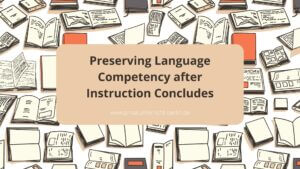Your Language Journey, Your Way: Start with a Private Tutor

Excelling In Language Proficiency Exams With Coach Assistance
Hey there! Are you preparing for a language proficiency exam? Feeling overwhelmed and unsure about how to ace it? Well, fear not! With the proper coach assistance, excelling in language proficiency exams can become your forte.
As someone who has helped numerous students achieve their desired scores, I know firsthand that acing these exams isn’t just about memorizing vocabulary or grammar rules. It’s also about understanding the test format and structure, developing effective study habits, and building confidence in your abilities.
In this article, I will share some tips and strategies on how to excel in language proficiency exams with the help of a coach.
So buckle up, and let’s get started!
Table of Contents
Understanding The Exam Format And Structure
As a preparation coach, it’s crucial to help students understand the format and structure of language proficiency exams. Knowing what types of questions will be asked in each section can give test-takers an edge in their performance.
Most language exams consist of four sections: reading comprehension, listening comprehension, writing expression, and speaking.
In the reading comprehension section, students must read passages and answer multiple-choice questions about them.
The listening comprehension section involves listening to audio recordings and answering related questions.
Writing expression tests your ability to write coherently on given topics, while speaking expression evaluates your oral communication skills through conversation or a monologue.
Time management strategies are also essential for success in these exams. Encourage students to divide their time wisely among the different sections based on their strengths and weaknesses – this way, they’ll have enough time to tackle every question confidently!
Developing effective study habits is another vital aspect of acing language proficiency exams. Let’s explore some tips to help you prepare for your upcoming exam!
Developing Effective Study Habits
Time management is critical for successful exam preparation; having a plan and sticking to it will help you stay on track.
Setting goals is essential, too – make sure they’re realistic and achievable, and remember to reward yourself when you reach them!
Active learning is a great way to review what you’ve learned – try summarising or teaching the material to a friend – it’ll help it stick in your brain!
Time Management
Do you need help with managing your time during language proficiency exams? Test anxiety and pressure can lead to poor time management, causing you to rush through questions or spend too much time on one section.
As a language exam preparation coach, I understand the importance of effective time management when excelling in these exams.
One way to combat test anxiety and improve time management is by taking practice tests under timed conditions. This will help you get used to the pace of the exam and allow you to allocate enough time for each section.
Another tip is to break down the exam into manageable chunks and set goals for completing them within a specific timeframe.
With these strategies, you can effectively manage your time during exams and perform at your best.
Goal Setting
Now that we’ve discussed time management in language proficiency exams, let’s move on to another critical aspect of developing effective study habits: goal setting.
As a language exam preparation coach, I often see students needing help with personal motivation when studying for these exams. Setting specific goals can help combat this issue and keep you on track throughout your preparation.
By breaking down larger goals into smaller, achievable ones, you’ll be able to stay motivated and focused while also managing your time effectively. So if you want to improve your language skills and perform well on an upcoming exam, start by setting clear and attainable goals for yourself.
Active Learning
Now that we’ve covered the importance of goal setting in developing effective study habits for language proficiency exams let’s move on to another crucial aspect: active learning.
As a language exam preparation coach, I often emphasize the benefits of interactive sessions and practice exercises when it comes to retaining information and improving linguistic skills.
Active learning involves engaging with the material through various means, such as discussions, debates, role-playing, or problem-solving activities. These techniques make studying more fun and increase motivation and retention rates.
Moreover, they provide opportunities to apply knowledge in real-life situations, which is essential for fluency.
So if you’re looking to ace your language exam, don’t rely on passive reading or memorization methods. Instead, strive for an interactive and hands-on approach by participating in group discussions or practicing with sample questions.
By doing so, you’ll be able to develop a deeper understanding and confidence while enjoying the process!
Building Confidence In Your Abilities
As discussed in the previous section, developing effective study habits is crucial to excelling in language proficiency exams. However, even with the most productive habits, anxiety and self-doubt can still creep up on you during exam day. That’s why it’s essential to focus on studying and building confidence in your abilities.
One way to overcome anxiety during an exam is through positive self-talk. Instead of letting negative thoughts take over, remind yourself of all the effort and dedication you put into preparing for this moment. Tell yourself that you are capable and confident, and trust in your skills and knowledge. With enough practice, positive affirmations can become a natural part of your thought process, helping you feel more at ease when taking an exam:
- Practice deep breathing exercises before an exam.
- Visualize success and imagine performing well on the test.
- Create a calming routine leading up to the exam day.
- Surround yourself with supportive friends or family.
We understand how daunting language proficiency exams can be. That’s why our approach involves tailored coaching to meet your individual needs. Whether you struggle with specific sections of the exam or want to work on reducing anxiety levels, our team of experienced coaches will provide guidance every step of the way. Together, we’ll develop strategies to help you perform at your best on exam day and build lasting confidence in your language abilities beyond just passing a test.
Tailored Coaching To Meet Your Needs
I’m here to help you excel in language proficiency exams with tailored coaching!
One-on-one sessions allow us to work through any issues you’re having, developing personalized study plans and time management strategies to make the most of our time together.
With my help, you’ll be well on your way to success!
One-On-One Coaching
Imagine having a personal coach who guides you through your language proficiency exam preparation journey.
With our personalized approach, we offer one-on-one coaching sessions to help you achieve your goals efficiently and effectively.
As an experienced language exam preparation coach, I understand that each student has a unique way of learning. That is why I tailor my teaching strategies to fit your needs for the best results.
Our coaching sessions are designed to boost your confidence in using the target language while improving your grammar, vocabulary, pronunciation, and writing skills.
Let me guide you toward success with our tailored coaching program!
Personalized Study Plans
Now that we have discussed how our coaching sessions are tailored to your unique learning needs let’s discuss the importance of personalized study plans.
At our language exam preparation program, interactive sessions and progress tracking are essential for success. This is why we take a holistic approach to creating personalized study plans for each student based on their strengths and weaknesses.
Our goal is not only to help you pass the exam but also to ensure that you become proficient in using the language in real-life situations. With our comprehensive progress tracking system, you can see your improvement over time and make adjustments as needed.
Let us work together to create a customized study plan that will lead you towards acing your language proficiency exam!
Time Management Strategies
As your language exam preparation coach, I understand adequate preparation goes beyond creating personalized study plans. Time management strategies are also essential to ensure you make the most out of our coaching sessions and overcome any anxiety about the test.
That’s why we work with each student to develop a schedule that fits their lifestyle while allowing enough time for practice and review. With proper time management techniques, you can optimize your learning experience and approach the exam confidently.
Let me guide you in developing an efficient plan to help you reach your language proficiency goals!
Achieving Your Desired Scores
Congratulations on taking the critical step towards excelling in your language proficiency exams! Achieving your desired scores can seem daunting, but it is achievable with proper preparation and guidance from a coach.
In this section, we will explore some key strategies that you can use to help you achieve your desired scores.
One of the most critical aspects of exam success is time management. You must manage your time effectively during the exam to complete all sections and questions within the allotted time frame.
To do this, ensure you clearly understand how long each section and question should take. Prioritize answering questions with more marks, leaving enough room for those requiring more thought. Remember, if you find yourself stuck on one particular question or section, move on to another and return later if time remains.
With adequate time management skills, achieving your desired scores will become much more accessible than expected!
Test-taking strategies are just as crucial when preparing for language proficiency exams. Procedures such as scanning through passages before reading them thoroughly or underlining keywords in multiple-choice options can improve accuracy while saving valuable seconds needed elsewhere.
Additionally, don’t forget about practicing prior mock tests available online or using past papers provided by official organizations to get an idea of what to expect on test day – familiarizing oneself with these formats helps reduce anxiety while allowing students to spot patterns they could’ve missed otherwise.
By employing these techniques alongside others discussed during coaching sessions, nothing stands between you and the score required for success – good luck!
Frequently Asked Questions
What Are Some Common Mistakes That Test-Takers Make During Language Proficiency Exams?
As a language exam preparation coach, I often see test-takers make common mistakes during their proficiency exams.
One of the most prevalent misconceptions is that adequate preparation means memorizing vocabulary and grammar rules. However, it’s crucial to remember that language proficiency tests assess one’s ability to communicate effectively in real-life situations.
Another mistake is not managing time wisely during the exam, resulting in incomplete tasks or rushed answers. It’s imperative to practice timed exercises as part of your preparation routine.
Lastly, many test-takers need to pay more attention to the importance of understanding cultural nuances and context when communicating in a foreign language, leading to misinterpretations and misunderstandings. To avoid these errors, focus on developing a holistic approach to language learning that incorporates listening, speaking, reading, and writing skills while immersing yourself in the culture through authentic materials such as books, movies, or news articles.
How Can One Overcome Test Anxiety And Nerves During The Exam?
Are you nervous about taking a language proficiency exam?
Feeling anxious is natural, but relaxation techniques and mindfulness exercises can help calm your nerves.
One effective method is deep breathing – inhale deeply through your nose for four counts, hold it in for seven counts, then slowly exhale through your mouth for eight counts.
Another way to ease anxiety is practicing mindfulness exercises such as visualization or positive affirmations.
Remember, confidence comes from preparation, so study well before the exam.
By using these techniques and preparing effectively, you can easily tackle any language proficiency exam!
Are There Any Specific Strategies Or Techniques For Improving One’s Listening Skills For Language Proficiency Exams?
Improving one’s listening skills for language proficiency exams requires active listening tips and exposure to diverse listening materials.
As a language exam preparation coach, I recommend incorporating techniques like note-taking, summarizing, and predicting while actively engaging with different media types, such as podcasts, news broadcasts, and films.
By intentionally focusing on understanding the nuances of spoken language in various contexts, test-takers can build their confidence and accuracy when it comes time to take the exam.
It is important to remember that effective communication involves not only comprehending individual words but also interpreting tone, intonation, and cultural cues.
Can Using A Language Proficiency Exam Preparation Book Or Online Resource Be As Effective As Working With A Coach?
When it comes to language proficiency exams, many students wonder whether using a preparation book or online resource can be as effective as working with a coach.
While self-study materials can help you gain knowledge and skills, they have limitations. For example, they may not provide personalized feedback on your strengths and weaknesses or allow you to practice speaking with an experienced tutor.
On the other hand, coaching benefits include one-on-one guidance from a professional who knows what examiners are looking for and how to tailor study plans to suit individual needs.
So if you want to maximize your chances of success, consider investing in support of a language exam preparation coach.
How Can One Maintain Their Language Proficiency Level After Taking The Exam?
Maintaining your language proficiency level after taking an exam can be challenging, but it’s crucial to stay in practice if you want to continue advancing.
As a language exam preparation coach, I believe there are many ways to keep practicing and improving your skills.
Consistency is one of the most important things – even just 10 minutes a day can make a big difference! Plenty of resources are available online, like podcasts or news articles and language exchange programs where you can practice with native speakers.
Remember that practice makes perfect, so find what works for you and stick with it!
Conclusion
As a language exam preparation coach, I have seen many students struggle with common mistakes during their exams. These include not reading the instructions carefully or rushing through questions without fully understanding them. However, with the proper guidance and practice, these errors can be easily avoided.
One way to overcome test anxiety is by practicing relaxation techniques such as deep breathing exercises before the exam. Additionally, it’s important to remember that making mistakes is a natural part of learning a new language and shouldn’t discourage you from continuing your studies.
With regular coaching sessions and dedicated practice time, you can improve your listening skills and excel in your language proficiency exams. While using a language proficiency exam preparation book or online resource can be helpful, working with a coach offers personalized feedback and support tailored to your needs.
A coach can identify areas that need improvement and provide targeted exercises to strengthen those skills—finally, maintaining your language proficiency after the exam requires continued practice and immersion in the target language through activities like watching movies or speaking with native speakers.
In conclusion, excelling in language proficiency exams requires dedication, hard work, and strategic planning. As a coach, I aim to help students achieve their full potential by providing customized instruction to meet their unique needs. By avoiding common mistakes and implementing effective study strategies, anyone can succeed on their language proficiency exams and take their communication skills to the next level!



